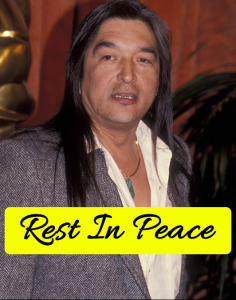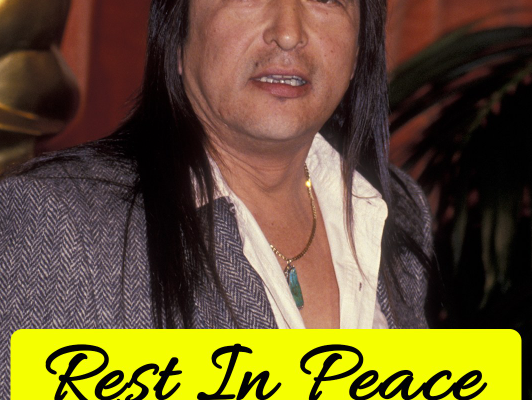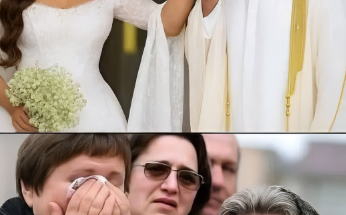With Heavy Hearts: Remembering Graham Greene, A Trailblazer of Indigenous Storytelling
On September 1, 2025, the world lost a cinematic icon and cultural trailblazer. Graham Greene, the Oscar-nominated Canadian First Nations actor best known for his role as Kicking Bird in Dances with Wolves, died peacefully in a Toronto hospital after a long illness. He was 73.
The announcement of Greene’s passing reverberated through the entertainment industry and Indigenous communities alike. Tributes poured in from fellow actors, directors, and fans who recognized not only his immense talent but also his unwavering commitment to representation, truth, and dignity in storytelling.
Born in 1952 in Ohsweken, Ontario, on the Six Nations Reserve, Greene’s journey to stardom was anything but conventional. Before stepping into the spotlight, he worked as a carpenter, welder, draftsman, carpet layer, roadie, and audio technician. Acting, he once said, was something he “stumbled into”—a profession that offered shade, food, and a place to speak lines. But what began as a curious detour became a lifelong vocation, one that would shape the landscape of Indigenous representation in film and television.
Greene’s breakthrough came in 1990, when he starred opposite Kevin Costner in Dances with Wolves. His portrayal of Kicking Bird, a wise and compassionate Sioux medicine man, earned him an Academy Award nomination for Best Supporting Actor. The film itself won seven Oscars, including Best Picture, and Greene’s performance was widely praised for its depth, nuance, and humanity. In a genre often criticized for its portrayal of Native peoples, Greene’s Kicking Bird was a revelation—dignified, complex, and unforgettable.
But Greene’s legacy extends far beyond a single role. Over the next four decades, he built a body of work that spanned genres, mediums, and continents. He appeared in blockbuster films like Die Hard with a Vengeance, The Green Mile, Maverick, and Thunderheart, as well as indie gems like Skins and Transamerica. His television credits included Northern Exposure, Longmire, Goliath, Reservation Dogs, 1883, and Tulsa King. He even lent his voice to the acclaimed video game Red Dead Redemption 2, further expanding his reach to new generations.
Greene’s performances were marked by a quiet intensity and emotional intelligence. He had a gift for inhabiting characters who carried the weight of history, trauma, and resilience. Whether playing a tribal elder, a grieving father, or a sardonic sheriff, Greene brought authenticity and gravitas to every role. He was, as actor Lou Diamond Phillips described him, “an actor’s actor… iconic and legendary”.
Beyond the screen, Greene was a fierce advocate for Indigenous artists and communities. He used his platform to challenge stereotypes, amplify marginalized voices, and mentor young talent. His success opened doors for others, proving that Indigenous stories could be told with integrity and reach global audiences. Actor Gil Birmingham called him “a man of incredible talent who made a positive impact on Native representation in film, inspiring a new generation of Native actors”.
Greene’s accolades were numerous. In addition to his Oscar nomination, he won a Grammy for Best Spoken Word Album for Children in 2000, a Canadian Screen Award in 2024, and the Governor General’s Performing Arts Lifetime Achievement Award in 2025. He was also made a Member of the Order of Canada in 2015, a recognition of his contributions to the arts and his country.
Despite his fame, Greene remained grounded. He was known for his wit, warmth, and humility. He often joked about the absurdities of Hollywood and spoke candidly about the challenges of being an Indigenous actor in a predominantly white industry. In one memorable interview, he recounted auditioning for Crimson Tide, only to be told by the director that he couldn’t imagine a Native American on a submarine. Greene’s response? “If you could, I would let you tell my four dead uncles who died in the Pacific on subs”.
Greene is survived by his wife of 35 years, Hilary Blackmore, their daughter Lilly Lazare-Greene, and grandson Tarlo. His family, while mourning his loss, has expressed gratitude for the outpouring of love and respect from around the world.
His final film, Ice Fall, a thriller directed by Stefan Ruzowitzky and co-starring Joel Kinnaman and Danny Huston, is set to be released posthumously. It will serve as a poignant coda to a career defined by courage, craft, and conscience.
As the credits roll on Graham Greene’s life, what remains is not just a filmography, but a legacy. He changed the way Indigenous people are seen in media. He challenged the industry to do better. And he did it all with grace, grit, and a deep love for his people.
In the words of his agent, Michael Greene: “He was a great man of morals, ethics and character and will be eternally missed. We love you. God bless you. You are finally free”.
Rest in power, Graham Greene. Your voice, your vision, and your spirit will echo for generations.

